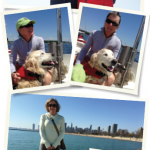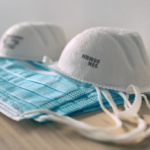Dr. Furie says the family business was handed to him after his brothers left for college. Although it completely paid for their college and graduate school tuitions, he vividly recalls how he couldn’t wait to go back to school at the end of each summer.
“It was a very difficult job, basically 8 a.m.–8 p.m., seven days a week, dealing with people on vacation who overestimated their skills,” he says, adding that the flotilla, which peaked at 35 rental boats, was a lot to oversee. “We were always out looking for lost boats. College looked easy compared to this.”
Still, he worked every summer through his second year in medical school. Then, after nine years of managing the business, he called it quits. He and his brothers sold the business to a former sailing instructor, and the property to the Spray Beach Yacht Club next door.
Since then, sailing has remained a big part of Dr. Furie’s life. In 1985, he moved his wife and two sons to Manhasset, N.Y., on Long Island, where he could live, work and sail within a few miles’ radius.
Some of his fondest memories involve a former sailing student and an instructor he hired. The junior high school student, Martin Bergman, became a rheumatologist in Pennsylvania and once introduced Dr. Furie as his sailing instructor at a national rheumatology meeting. The instructor, Gregory Mankiw, moved on to serve as chairman of the Council of Economic Advisers for President George H.W. Bush and mentioned his job as a sailing instructor in his White House biography.
Trophies & Aquariums
Not surprisingly, Dr. Furie’s home is filled with racing trophies. One of his favorite wins was the Manhasset Bay Fall series, which attracts top competitors from the East Coast.
Dr. Furie believes sailing and medicine have much in common. Sailboat racing, for example, is highly competitive. So is medical research, which involves competing for grants and awards and achieving recognition as a top investigative site.
Likewise, both pursuits are cerebral occupations. Sailors must understand the physics of the sails and wind, for instance. Then there’s teamwork, leadership and strategy skills, which both professions rely on to succeed.
Dr. Furie stopped racing sailboats years ago because of his grueling work schedule and the difficulty of finding experienced sailors who could devote consecutive weekends to racing. But that hasn’t prevented him from enjoying his 26′ sailboat during the summer months. Five years ago, he and two other rheumatologists and a neurophysiologist rented a 50′ sailboat for one week and sailed around the Caribbean.




